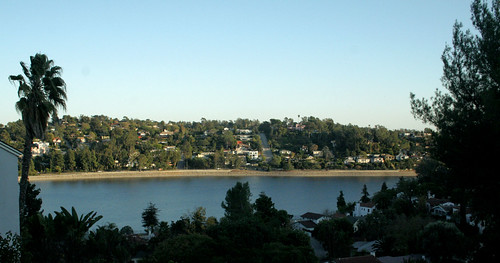
In order to get ready for the upcoming candidate forums, I needed to determine what solutions I had for all the issues that were likely to be discussed. First I listed all the topics I could think of that could be addressed by the Neighborhood Council. I’ll address them in no particular order here.
Crime Prevention: The best tool we have right now is Neighborhood Watch. With an active neighborhood watch group, communications are enhanced, awareness is increased and information is shared. When each person knows his neighbors and something of their habits, things that don’t fit are more easily observed. You need to know what is normal before you can see what is abnormal. If your neighbor’s teen-aged son and his friends hang around on the sidewalk in front of his house, that might be considered normal. If a few young people who you’ve never seen before are hanging around in front of his house, that would be noteworthy. You might call your neighbor and ask him what was going on. The group on the sidewalk might prove innocuous, or it might be of concern, depending upon what you find out from your neighbor. That’s the value of Neighborhood Watch, it gets people looking out and interested in what’s going on outside their houses. Information about what attracts crime to the neighborhood can also be shared among the neighbors. Then, if you see that one of them forgot and left their expensive electronic device in plain sight on the seat of their car, you can remind them that it would be safer if they put things away and out of sight. Communication, awareness and shared information, along with a close working relationship with local law enforcement, works very well in keeping a neighborhood safe.
Neighborhood Watches from different areas can ally and work together to expand their influence and make safer and ever increasing area and the network grows. More importantly, the Neighborhood Watch is a way for people to take responsibility for themselves, their neighbors, their neighborhood and their city without becoming overly dependent upon government to keep them safe. Law enforcement is just that, enforcement. Crime prevention is another matter and is best handled by individuals working together to create an environment where criminal activity is not tolerated, which is what Neighborhood Watch does best.
Disaster Preparedness: Like the Neighborhood Watch, a good disaster preparedness program can also enhance communications, awareness and be a way to share information and concerns. If only you, of all your neighbors, are the one prepared to survive in case of a major disaster, your survival will be less assured than if your neighbors were also adequately prepared. If you all have food, water, tools, first aid supplies and other necessities in quantities sufficient to survive until things get back under control, then you can concentrate on doing just that, surviving, not defending your supplies from those hungry people who didn’t plan ahead. Neighbors working together so as to be prepared for whatever might happen gives the neighborhood a broader purpose then just living day-to-day. People thinking about how they can help one another in a disaster scenario will tend to be very good neighbors indeed.
Open Space: Rather than looking to government to acquire, with taxpayer money, any given open space or green space area, and then spend more money to create a safe, attractive and usable space for the community, those people who live in the area ought to band together and buy the land they wish to preserve and then hold it in trust for the community. Those who use the space should be the ones to pay for development and maintenance of that space.
Community Gardens: If you want to get together with your neighbors and plant a garden, then one or more of you should allow the group to use your land for the garden. As with the open space/green space concept, if it is something you want then you and those of like mind ought to be the ones who pay for it. Finance it as a co-op with shared benefits and shared expenses.
The Silver Lake and Ivanhoe Reservoirs: As long as these bodies of water are owned by the city, plans to open up the shorelines to the public will be just dreams that will never come true. The city will never open itself up to the liability of a recreational facility of that magnitude. The fence will never be completely gone.
Parking: The battle for parking spaces between businesses and residents cannot be resolved without some sacrifice on both sides. The public transportation system in Los Angeles, which includes streets, freeways, trains, subways and buses, is inadequate to the needs of the city. Until public transportation can, in a timely manner, get you to where you need to go, people will find other ways to get around. Los Angeles is not a dense European city; instead it is a giant, sprawling, unorganized group of suburbs and neighborhoods that don’t lend themselves well to public transportation.
Commercial Development: Commerce is good, that’s where jobs come from, among other things. However, new businesses must be carefully evaluated as to their impact upon the community in the areas of added traffic, both foot and auto. There needs to be a balance between residential and commercial space so that everyone gets what they need. If the new business is a bar or restaurant, noise late into the evening can be a problem for the people living nearby. Patrons need a place to park and if the business has inadequate space for that purpose, the neighborhood becomes their parking lot to the detriment of the residents therein.
Small Lot Development: This is a concept where a number of dwellings are built close together on a single lot with a shared common area and a shared parking area. Depending upon the number of units that are built, this can work or not inside a residential neighborhood. If there is adequate parking and setback from adjacent living spaces, it could be workable for the surrounding residents. If not, then the added traffic and noise may be quite detrimental to the neighborhood.
AirBnB: AirBnB is a big business and there is a lot of money at stake, both for the company and for the participating homeowners, but if you are negatively impacting your neighbors through parking problems, excess noise at unusual hours and disrespect for the neighborhood, then you are being unethical in running your home as a BnB. If you are not zoned for short-term rental, then you should not be using your property in that way. You should have gotten permission or variance from the city before beginning a short-term rental program in a residential neighborhood. You knew the zoning regs when you bought the home and should abide by them now. If you wish to change the zoning regulations so that you can legally operate a BnB from your home, then you should continue to go through the legal process with the city and attempt to make that change. At present, though, it is a violation of the law and operations should be suspended until the legal process is completed.
Gangs and the Gang Injunction: If the word Gang is defined as a support group for criminal activity, then it has no legitimate function in the community. The violence and intimidation that are used in the course of gang business are unacceptable in a civil society. If the gang injunction gives law enforcement another tool to curb the violence and discourage the gang in its operations, I am all for it.
Budget Overages for the SLNC: If we are to be proper stewards of a portion of taxpayer monies, then we should strive to get as much benefit as possible for the least amount of money spent. Giving away money to "worthy causes" as a feel-good gesture is not a proper function of government. It we can use the taxpayer monies to make the neighborhood safer, more attactive, more pleasant to live in, then, perhaps, that is money well spent. Otherwise, that money is best left in the pockets of the taxpayers by way of lowered taxes and less money spent on government.
Pedestrian and Bicycle Safety: No driver wants to run over another human being. Did I even need to say that? It happens, though, and it needs to be addressed. Part of the problem is distracted drivers – drivers doing something else besides paying attention the road in front of them, the traffic, the bicycle wobbling along between the parked cars and lane of traffic, the upcoming crosswalk, the guy about to jaywalk, etc. There is too much going on while driving a car to be doing anything other than just driving and paying attention to everything around you. Driving while texting, talking on the phone, programming the GPS, tuning in the radio, applying makeup, eating, drinking, or anything else that isn’t driving, is the wrong thing to do. Another aspect of the problem that I have observed is they some bicyclists ride very aggressively and put themselves in unnecessary peril instead of riding defensively and avoiding potential encounters with large, heavy, moving metal objects.
Infrastructure – Street and Sidewalks: This almost naturally falls into the purview of the Neighborhood Watch. Damages streets and broken sidewalks are a public safety issue. While we’re out keeping an eye on the neighborhood, we could also take pictures of infrastructure damage and forward them on to our local City Council Office as coming from the Neighborhood Watch Group. This would give the complaint a bit more weight and might precipitate more prompt action by the city. If there are unhappy voters involved, the politicians tend to pay attention.
Water Use: I’m all for frugal use of water. We live in a desert, after all. Most people don’t overwater, or waste water because it costs them money when they do. That sort of regulation makes sense to me, and it falls under what government does best, which is stop things it doesn’t like. Making things more expensive tends to lessen demand for them. Making them too expensive gets you back into politics and politicians who can require the Department of Water and Power to keep fees at reasonable levels so as to keep the voters content.
Homelessness: This isn’t really an issue that a Neighborhood Council can do very much about, except offer sympathy to the poor souls who live on the street. Some large percentage of the homeless population is being created by the “mental health” industry which destroys people by using psychotropic medications, and barbaric “therapies,” and then turns them out onto the street when their insurance runs out. It’s a bigger problem than a Neighborhood Council is designed to handle.
Noise and Activity from the Local Bars: This is an area where the Neighborhood Council could help, but the hard work must be done by those most affected, the neighbors themselves. One nearby group of neighbors banded together and, with some help from certain members of the Neighborhood Council with City Hall connections, is having permit parking implemented in their area. This will force the bars to provide some other place for the patrons to park and it will move those patrons out of the neighborhood where they were very much a nuisance. This is good example of what a Neighborhood Council ought to be doing. It should be helping people in the community to define and work out how to solve their own problems.
Once I had defined the issues for myself, I was able to go into the candidate forums knowing what I wanted to say about each one. As it turned out, very few of the issues were address in the forums. The time given to each candidate to speak on any given subject was never any longer than 60 seconds. You can’t say very much in that length of time. It didn’t matter much what anyone said because there were more candidates at the forums than public. We were essentially taking to each other, which accomplished nothing.
In thinking about all these issues in light of my philosophy
on government, I realized that what people really need to do is figure out how
to solve their own problems, rather than waiting for some government agency to
solve it for them. A government’s main
power is the ability to stop things.
People don’t really need stopping as much as they need to simply look
around, talk to their neighbors, get a good idea of what the real problem is
and then work out a solution. That’s
basically what I said at both of the candidate forums. No one got it. They weren’t there to encourage self-reliance
or independent initiative, the candidates were they because they want to be
part of the government and the audience was there to see what the candidates
were going to promise to do for them. It
was politics at its worst. I did not
enjoy it.


